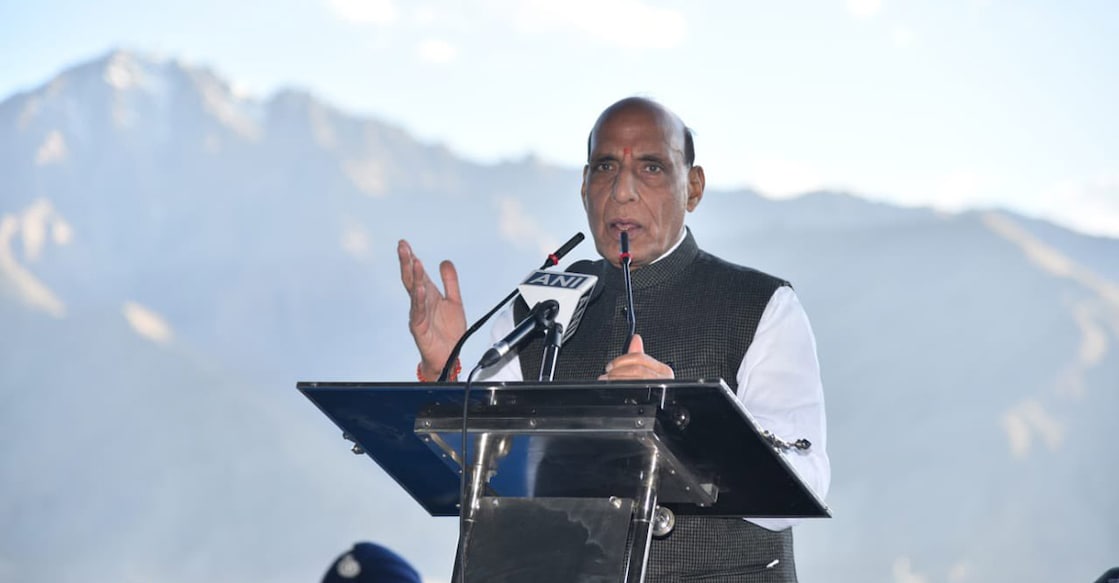No loss of life or serious injury to soldiers: Rajnath Singh in Parliament

Mail This Article
New Delhi: The Indian Army bravely thwarted an attempt by the Chinese PLA from "unilaterally" changing the status quo in the Yangtse area of Arunachal Pradesh's Tawang sector on December 9, Defence Minister Rajnath Singh said in Parliament on Tuesday. There were no fatalities or serious injuries to Indian troops in the scuffle, he said.
In a suo motu statement in Lok Sabha, Singh also said Indian troops confronted the attempt in a "firm and resolute manner", and Chinese personnel went back to their locations due to the timely intervention of Indian commanders.
He also made an identical statement in Rajya Sabha.
Singh's statement came a day after the Indian Army said troops from two sides clashed along the Line of Actual Control (LAC) in the Tawang sector and the face-off led to "minor injuries to a few personnel from both sides".
"On December 9, PLA troops tried to transgress the LAC in the Yangtse area of the Tawang sector and unilaterally change the status quo. The Chinese attempt was contested by our troops in a firm and resolute manner," Singh said.
"The ensuing face off led to a physical scuffle in which the Indian Army bravely prevented the PLA from transgressing into our territory and compelled them to return to their posts," he said.
Singh said the scuffle led to injuries to a few personnel on both sides.
"I wish to share with this House that there are no fatalities or serious casualties on our side. Due to the timely intervention of Indian military commanders, PLA soldiers went back to their locations," the defence minister said.
Singh said as a follow up of the incident, the local commander of the Indian Army in the area held a flag meeting with his counterpart on December 11 to discuss the issue in accordance with established mechanisms.
"The Chinese side was asked to refrain from such actions and maintain peace and tranquillity along the border. The issue has also been taken up with the Chinese side through diplomatic channels," he said.
The defence minister assured the House that Indian forces are committed to protecting the country's territorial integrity and will continue to thwart any attempt made on it.
"I am confident that this entire House will stand united in supporting our soldiers in their brave effort," he said.
The Tawang incident is the first major clash between the India and the Chinese armies since August 2020 near Rinchen La in eastern Ladakh.
Indian and Chinese troops were engaged in a brief face-off near Yangtse in October last year as well and it was resolved following talks between local commanders of the two sides according to established protocols.
The ties between India and China nosedived significantly following the fierce clash in the Galwan Valley in June 2020 that marked the most serious military conflict between the two sides in decades. Both sides gradually enhanced their deployment by rushing in tens of thousands of soldiers and heavy weaponry.
Following the eastern Ladakh standoff, the Indian Army significantly bolstered its operational capabilities along the LAC in the eastern theatre.
The army put into place an effective surveillance apparatus and there has been a substantial improvement in overall monitoring of the areas in the last two years, military officials said.
In September, Eastern Army Commander Lt Gen Rana Pratap Kalita had said the Indian Army is continuously monitoring activities of the PLA along the LAC and is well-poised to mitigate any challenges.
"We are also continuously monitoring the activities along the borders. We are vigilant and observant of each and every development along our borders," he had said.
India has been maintaining that its relationship with China cannot be normal unless there is peace in the border areas.
India has been ramping up the development of infrastructure along the near 3,500-km LAC following the eastern Ladakh standoff that began on May 5, 2020.

